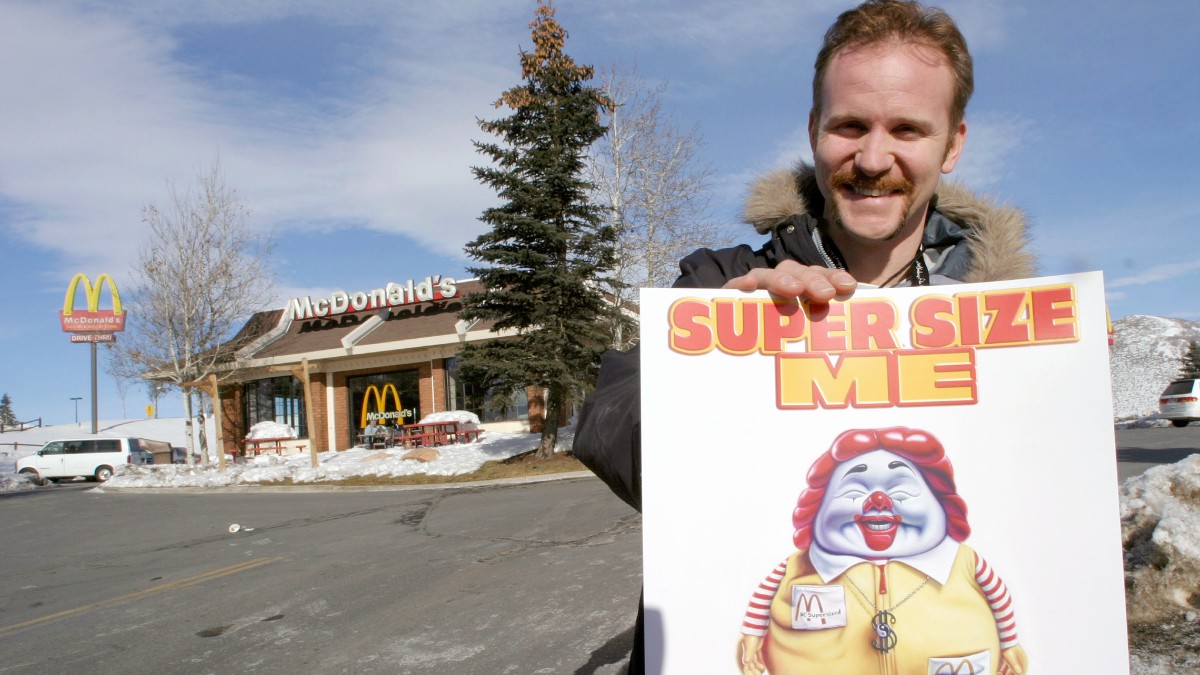Filmmaker Morgan Spurlock recently passed away, renewing interest in the controversial documentary that made him a Hollywood name: Super Size Me.
Released in 2004, the documentary follows Spurlock as he conducts an experiment in which he eats nothing but McDonald’s for 30 days straight. Super Size Me was meant to examine how culpable fast food restaurants are in rising weights across the United States. Over the course of his experiment, Spurlock allegedly gained 24 pounds and suffered psychological and health effects from his diet. The documentary was hailed as a major success, even receiving an Academy Award nomination for Best Documentary Screenplay.
But was Super Size Me ever all that groundbreaking? Instead of consuming his typical daily intake, Spurlock specifically ate about 5,000 calories worth of McDonald’s per day, making it only logical that he experienced weight gain. It’s also fairly well-known that fast food isn’t the most nutritious option out there. Instead of trying to reiterate this tired point for the umpteenth time, wouldn’t it be more beneficial to get to the actual root of the problem, such as how many Americans rely on fast food and other affordable food options because they don’t make livable wages or live in food deserts, or how toxic work culture makes fast food a more attractive option for exhausted and overworked Americans? Unfortunately, Super Size Me‘s problems go far beyond its unoriginal and unhelpful hypothesis.
The skewed results of Super Size Me
One of the biggest reasons for the controversy around Super Size Me is the potentially skewed results. As mentioned above, for the experiment, Spurlock began eating 5,000 calories a day, which was far more than his usual intake. He also completely stopped exercising during this time. Yet he tried to portray it as so shocking that he gained 24 pounds over the course of the experiment, attributing the weight gain solely to the food instead of to his elevated calorie intake and change in exercise.
Others, including Soso Whaley and Tom Naughton, have replicated Spurlock’s experiment and found that they actually lost weight when eating McDonald’s every day for a month because they maintained their usual calorie intake and exercise routines. Unlike Spurlock, Naughton also carefully logged everything he ate and the calories in each item to prove his weight and food intake matched one another. If you watch Super Size Me, you can see Spurlock desperately trying to exaggerate the results by ordering far more food than the average person does at McDonald’s and refusing to log or show everything he ate.
Purposefully skewing the results is very problematic because it presents a false and harmful narrative. Spurlock did everything in his power to ensure he’d gain weight so that he could present this grossly simplified narrative that all one must do is give up fast food, and they’ll be thin, but if they eat fast food, they’ll be fat. Of course, Whaley and Naughton’s experiments showed different results because weight gain and loss are not simple and depend on numerous factors, some of which are not within an individual’s control. This simplified and misleading view of weight gain and loss only intensifies discrimination towards fat people, perpetuating the false notion that their weight is completely in their control and can be impacted by a single diet change.
In addition to purposefully eating as many calories as possible, Spurlock later seemingly admitted to drinking alcohol during the experiment and lying about it. That lie surfaced alongside an even more considerable controversy: In 2017, Spurlock published a blog post in which he admitted to committing sexual assault and misconduct. The post came at the height of the #MeToo movement and was especially bizarre because Spurlock genuinely seemed to think that he was proving he was better than other abusers by admitting to his actions without prompting. He also tried to provide excuses for his actions, suggesting it may have been due to his alcoholism. Spurlock wrote that he had been drinking since the age of 13 and hadn’t been sober for more than a week in the past 30 years, which would’ve included the month he filmed Super Size Me.
The detail stuck with readers because, in Super Size Me, Spurlock claimed that he suffered liver damage from his diet. However, that may have been a symptom of his alcoholism, which he conveniently didn’t disclose during the experiment. In fact, alcoholism could’ve contributed to all the symptoms he experienced, including weight gain and mood swings. Of course, that detail paled in comparison to the content of the full blog post. The blog led to his Super Size Me sequel initially losing distribution and receiving nowhere near the fanfare of the original, which may have been for the best.
The fatphobia in Super Size Me
What is especially problematic about Super Size Me‘s skewed and exaggerated results is that they are used to promote fatphobia. After all, the entire documentary is a cautionary tale about how eating fast food will make you fat. In trying to utilize the fear factor, it insinuates that being fat is something scary, making it one of countless films to promote the belief that being fat is the worst thing someone can be.
As soon as it begins, Spurlock narrates how America is the fattest nation in the world, describing obesity as a disease and “epidemic.” The fear-mongering narration over an image of states on an American map darkening with obesity statistics are paired with B-roll footage in which the camera zooms in on people with larger bodies. These clips continue recurring throughout the documentary. The people are seen on the beach, at the pool, or walking down the street. They’re just people living their lives, but it’s clear the documentary expects viewers to be horrified because heavy people are supposedly scary.
In addition to promoting the belief that fat people need only give up fast food to be thin, Spurlock claims his experiment conditions were intended to reflect the average American lifestyle—falsely portraying fat people as individuals who eat 5,000 calories a day and never exercise.
Most dangerously, Spurlock tries to shame people for eating. At one point in the documentary, he films himself eating one value meal from McDonald’s, which supposedly causes him to vomit. Of course, eating a single average-sized meal doesn’t make one vomit, so it’s clear Spurlock either ate far more food off-camera to induce vomiting or faked the whole thing. The staged vomiting attempts to convey the false message that eating a full McDonald’s meal is disgusting and a superhuman feat that would make a regular thin person throw up. In a country where eating disorders are on the rise, it’s despicable to genuinely try to make viewers think there is something wrong with them for simply eating a meal.
Super Size Me doesn’t offer groundbreaking results or solutions to struggling Americans who find fast food the most convenient option. It is simply a documentary about a man who wanted to gain weight by eating fast food, so he did. However, Spurlock skewed the results in such a way as to encourage further stigmatization of fat people and shame countless individuals for the completely insignificant act of eating a fast food meal once in a while.









Published: May 24, 2024 05:23 pm